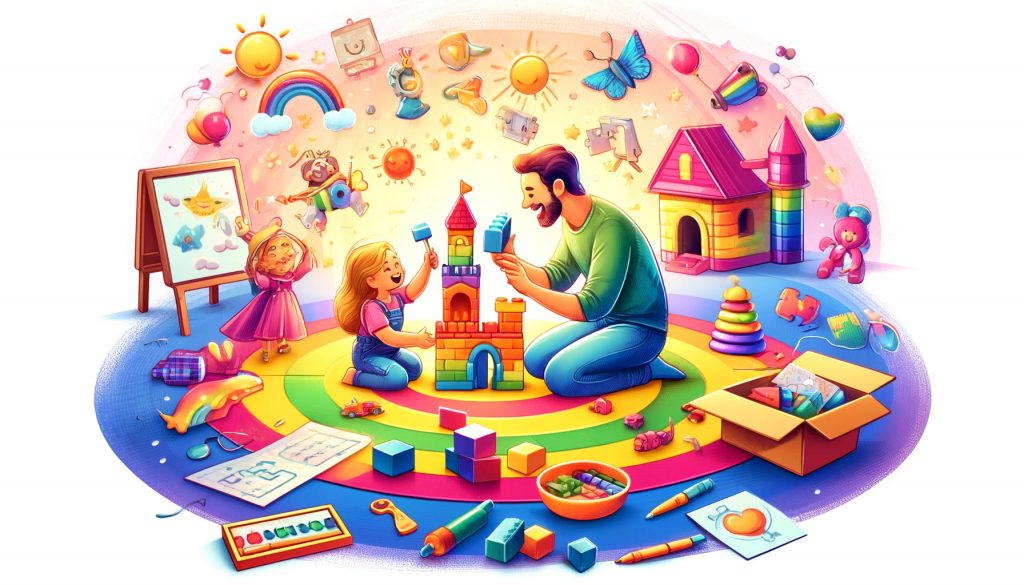The parent-child bond is a sacred connection that sets the stage for a child’s emotional and social development. It lays the foundation for their future relationships, self-esteem, and overall well-being. As parents, it is our responsibility to nurture this bond and create a strong connection with our children. In this article, we will explore some effective parenting tips to strengthen the parent-child bond and foster a loving and supportive family environment.
Key Takeaways:
- Cultivate love and affection through gentle touch and expressing unconditional love.
- Devote quality time to your child and engage in play activities together.
- Promote effective communication by creating a safe space for open dialogue.
- Establish consistency in routines, rules, and discipline.
- Remember that building a strong parent-child bond is a continuous and individualized journey.
Showing Love and Affection
Expressing love and affection towards your child is essential for building a strong bond. Through gentle touch, hugs, and genuine interactions, you can create a nurturing environment where your child feels safe and loved. Saying “I love you” frequently and unconditionally reinforces the emotional connection and contributes to a positive long-term relationship. Additionally, active listening and empathizing with your child’s feelings promote mutual respect and understanding.
The Power of Love and Affection
Love and affection play a significant role in developing emotional bonding with your child. When you show affection, it helps your child feel secure, valued, and cared for. Physical touch, such as gentle strokes or hugs, releases oxytocin, a hormone that creates a sense of well-being and strengthens the emotional bond between a parent and child. By consistently displaying love and affection, you create a foundation for healthy relationships in your child’s life.
- Show affection through physical touch, such as hugs, kisses, and holding hands.
- Give warm and genuine compliments to make your child feel loved and appreciated.
- Engage in active listening to validate and understand your child’s thoughts and feelings.
- Empathize with your child’s emotions, showing them that you care and are there for them.
The Importance of Communication Skills
Effective communication is vital for building and maintaining healthy relationships. It plays a crucial role in the parent-child bond as well. By cultivating good communication skills, you create an environment that fosters emotional bonding and understanding.
- Be present and attentive when your child is talking to you.
- Prioritize active listening, allowing your child to express themselves without interruption.
- Show empathy and validate your child’s feelings, helping them feel understood and supported.
- Encourage open and honest communication, creating a safe space for your child to share their thoughts and concerns.
By incorporating these practices into your daily interactions, you can strengthen the emotional bond with your child and establish a foundation for healthy, loving relationships.
Quality Time and Play
Spending quality time with your child and engaging in play is an effective way to strengthen the parent-child bond. Participating in play activities encourages language development, emotional expression, and social skills. Regardless of the activity, the key is to be fully present and give your child undivided attention. Setting aside distraction-free time and creating family rituals, such as eating meals together, also promote bonding and a sense of belonging.
Playtime is more than just a fun activity; it has a significant impact on your child’s development. When you actively engage with your child through play, you provide them with a secure and nurturing environment to explore their curiosity, express their emotions, and develop vital cognitive and motor skills. Play promotes creativity, problem-solving abilities, and critical thinking, laying the foundation for their future success.
Language Development
Playtime offers an excellent opportunity to enhance your child’s language skills. Through imaginative play, storytelling, and conversation during activities, you can stimulate their vocabulary, grammar, and overall communication abilities. Take turns talking and listening, encouraging your child to express themselves and ask questions. This interactive language experience fosters their linguistic development, making it easier for them to express their thoughts and emotions as they grow.
Social and Emotional Skills
Engaging in playtime activities with your child also supports their social and emotional well-being. It allows them to practice sharing, taking turns, and cooperating with others, developing essential social skills. Through play, children learn to manage their emotions, understand empathy, and navigate relationships. It is during play that they experiment, make friends, and learn to resolve conflicts, nurturing their emotional intelligence and teaching them crucial life skills in a safe and enjoyable environment.
To enhance the social and emotional benefits of playtime, create opportunities for your child to interact with other children their age. Arrange playdates or enroll them in playgroups where they can engage in cooperative and interactive play. These experiences further foster their ability to connect with others, leading to healthier relationships throughout their lives.
Undoubtedly, play is an essential aspect of attachment parenting that strengthens the parent-child bond and contributes to your child’s overall well-being. By dedicating quality time to play and being fully present, you create lasting memories, build trust, and deepen the connection between you and your child.


Effective Communication and Consistency
When it comes to building a strong parent-child bond, effective communication plays a vital role. By creating an environment where your child feels comfortable expressing their thoughts and feelings, you foster open dialogue and trust. This communication skill is essential for healthy relationships and sets the foundation for a strong parent-child connection.
To promote effective communication with your child, it’s important to actively listen and validate their emotions. Encourage them to share their experiences, ask questions, and engage in meaningful conversations. By showing genuine interest and respect for their thoughts, you strengthen the bond between you and your child.
Consistency also plays a significant role in building a strong relationship with your child. Maintaining consistent routines, rules, and boundaries provides stability and helps children understand expectations. When they know what to expect, they feel secure and are more likely to trust and respect your decisions.
Consistency is especially important when it comes to discipline. Implementing age-appropriate consequences for misbehavior reinforces the understanding of boundaries and fosters a sense of responsibility. By consistently enforcing discipline, you create a secure environment where your child knows what is expected of them.
Let’s take a look at some practical parenting tips to enhance communication skills and maintain consistency:
- Set aside regular one-on-one time with your child to listen to their thoughts and concerns, fostering open communication.
- Establish clear rules and boundaries, consistently reinforcing them to promote a sense of stability.
- Be mindful of your own communication style and model healthy communication practices.
- Practice active listening by giving your child your full attention and repeating back what they say to ensure understanding.
- Use positive reinforcement when your child follows the rules or shows good behavior to encourage and reinforce positive communication.
By nurturing effective communication skills and maintaining consistency, you are not just strengthening the parent-child bond, but also equipping your child with valuable skills for their future relationships and overall well-being.
| Benefits of Effective Communication and Consistency | How to Achieve Benefits |
|---|---|
| 1. Enhanced trust and understanding | – Actively listen and validate your child’s thoughts and feelings – Engage in meaningful conversations |
| 2. Improved behavior and respect for boundaries | – Establish clear rules and boundaries – Consistently reinforce them through age-appropriate consequences |
| 3. Strengthened parent-child bond | – Set aside regular one-on-one time for open communication – Model healthy communication practices |
Through effective communication and consistency, you can create a nurturing environment that fosters healthy relationships and strong family connections. By implementing these parenting tips, you are equipping both yourself and your child with the necessary skills for maintaining a loving and supportive relationship.
Conclusion
Building a strong parent-child bond is essential for fostering healthy relationships and promoting child development. Through love, affection, quality time, effective communication, and consistency, we can create a deep and lasting connection with our children.
By showing love and affection, we provide a nurturing environment where our children feel safe, valued, and loved. Expressing our love through gentle touch, hugs, and frequent “I love you”s strengthens the emotional bond, laying the foundation for a positive long-term relationship.
Spending quality time with our children and engaging in play is another powerful way to enhance the parent-child bond. When we actively participate in play activities, we promote language development, emotional expression, and social skills. Creating distraction-free time and establishing family rituals, such as eating meals together, further strengthen our bond and foster a sense of belonging.
Effective communication and consistency are also crucial in building the parent-child bond. By providing a safe and open environment for our children to express their thoughts and feelings, we establish trust and promote healthy dialogue. Maintaining consistent routines, rules, and boundaries helps children understand expectations and provides stability, fostering a secure environment for their growth.
In conclusion, nurturing the parent-child bond is a continuous process that requires time, effort, and dedication. As each child is unique, adapting our approach to their individual needs is essential. By prioritizing love, affection, quality time, effective communication, and consistency, we empower our children to flourish in various aspects of life, contributing to their overall well-being and emotional development.
FAQ
Why is building a strong parent-child bond important?
Building a strong parent-child bond is crucial for a child’s emotional and social development. It serves as the foundation for their future relationships and overall well-being.
How can I show love and affection to strengthen the parent-child bond?
Expressing love and affection through gentle touch, hugs, and genuine interactions creates a nurturing environment where your child feels safe and loved. Saying “I love you” frequently and unconditionally reinforces the emotional connection.
How can spending quality time with my child strengthen our bond?
Spending quality time with your child and engaging in play activities is an effective way to strengthen the parent-child bond. Participating in play encourages language development, emotional expression, and social skills.
How can I communicate effectively with my child to strengthen our bond?
Effective communication is vital in any relationship, including the parent-child bond. Creating an environment where your child feels comfortable expressing their thoughts and feelings fosters open dialogue and trust. Consistent routines, rules, and boundaries provide stability and help children understand expectations.
How can consistency contribute to building a strong parent-child bond?
Maintaining consistent routines, rules, and boundaries provides stability and helps children understand expectations. Consistent discipline, with age-appropriate consequences, reinforces the understanding of boundaries and promotes a secure environment.



